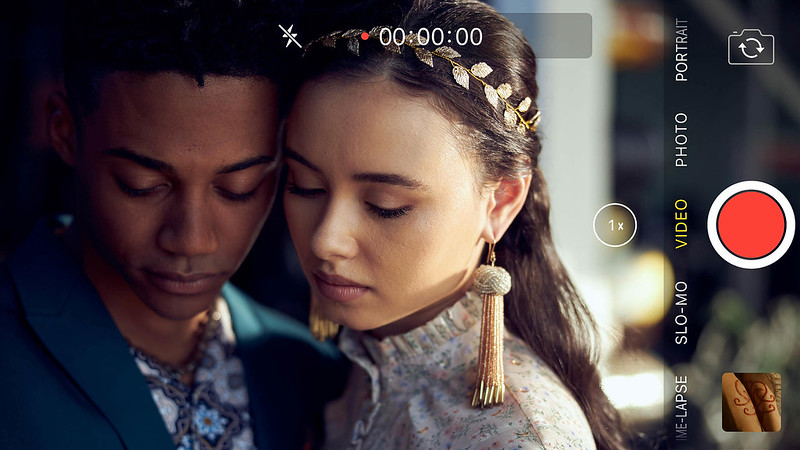What to Watch Verdict
Given how much of contemporary life takes place via mobile phone or online, a take on one of Shakespeare’s classics that leans into the tech age feels a little, inevitable. That's not necessarily a bad thing.
Pros
- +
💌Strong cast performances.
- +
💌Use of music.
Cons
- -
💌Uneven pacing.
- -
💌Disjointed world-building.
R#J is part of our Sundance Film Festival 2021 coverage. You can find all of our reviews here.
It was only a matter of time before someone wondered: how would Romeo and Juliet’s relationship - and life in fair Verona - unfold in the age of social media? Director Carey Williams’ answer, R#J, reworks Shakespeare's oft adapted tale of “star-crossed lovers” into a story with a rhythm more likely to resonate with a new audience. Williams mix of traditional filmmaking and screen-like format preserves the tone of the original text but the delivery is a refreshing blend of the colloquial and classic.
Have no fear purists, while this relationship plays out (pun intended) as though seen through the front-facing camera of a smartphone, the Bard’s words remain largely intact. The comment section, however, takes the place of the Chorus in this melodrama; and rightly so.
In a world where lurking on someone’s Instagram before sliding into their DMs is more common than watching them on a balcony from afar, kindling an attraction via social media and witnessing love blossoms via text messages with shared song playlists, and "likes" fan the flames doesn’t feel at all far-fetched.
Led by a GenZ-age Black and Latino cast, Williams explores the identity of these young characters bound up in the rules and expectations of family and dynasty. R#J opens with Romeo (Camaron Engels) returning to Verona to spend time with his father. The increasingly violent feud between the Montagues and Capulets is artfully conveyed via IG live. This sets the stage and tone for this experimental production. By the time you meet Juliet (Francesca Noel), the play takes off in earnest and with its delicate balance between bird’s eye view and confidence screen presences, connects.
Led by a GenZ-aged Black and Latino cast, Williams explores the identity of these young characters bound up in the rules and expectations of family and dynasty. central storyline. This is a strong ensemble decidedly unafraid to emoted which makes up for the digital separation to a large degree. Plus, there are enough flashes of brilliance and sweetness to push through some of the modern twists fall short of the mark; failing to properly flesh out this update.
Given how much of contemporary life takes place via mobile phone or online, a take on one of Shakespeare’s classics that leans into the tech age feels a little, inevitable. Thankfully William’s debut feature does more than slap an overlay - to mimic an app's UI - on the camera lens to tackle the challenge. There’s a delicacy to the lead and supporting performances that makes witnessing these private communications feel intimate despite the detachment of technology. It’s almost like being privy to how these friends and lovers connect and relate to one another makes understanding how such circumstances reach a crisis point from a wholly new perspective.
The latest updates, reviews and unmissable series to watch and more!
This rather bold experiment that doesn’t get everything right (there are just some scenes it’s not okay to cut out of your remake) but I found myself strangely enamored with it regardless. It’s soundtrack, costume design, artful use of visual-media elements and savvy location choices work to ground the film’s more detached elements and tether its erratic pace to reality.
Some of the updates and editing jumps don’t quite work but the strength of the connection to modern-day circumstances (the story doesn’t shy away from folding police brutality, cyberbullying and the mob-like impact of going viral) and flashes of brilliance from cast performances, R#J proves it can cut it as more than just a gimmick.
Some of the script changes are likely to be jarring and the “post-credit” sequence will definitely set off more than a few debates about when it’s cool to take creative license. It won’t work for everyone but this is one reinvention that proves that Shakespeare always plays.
Ro is a Rotten Tomatoes approved film/tv critic, writer and host on several of the MTR Network's podcasts. She's a member of the San Diego Film Critics Society and the Online Association of Female Film Critics. She's a former culture columnist for San Diego CityBeat (may it rest in peace) with a serious addiction to genre fiction, horror and documentaries. You can find her sharing movie and book recs and random thoughts, on her podcast I Talk Sh!t and Read or in her newsletter, Shelf Envy.


